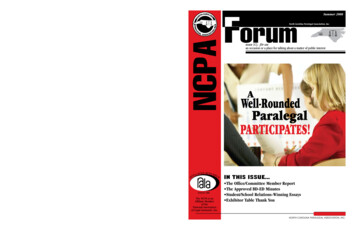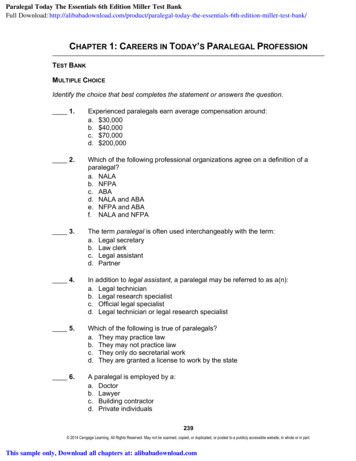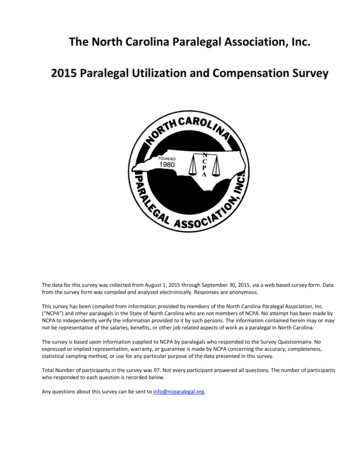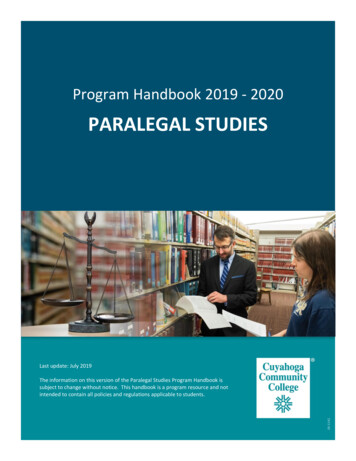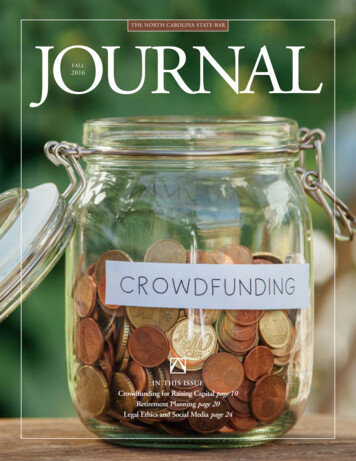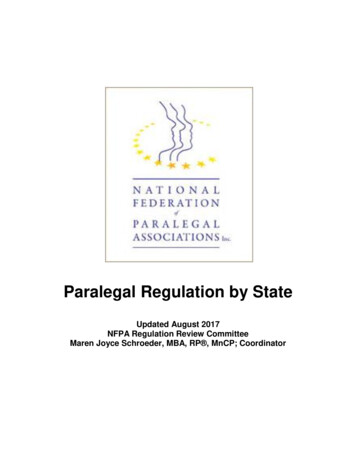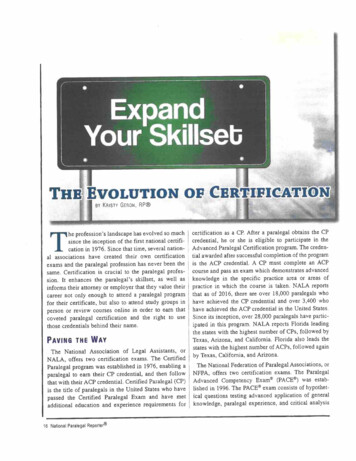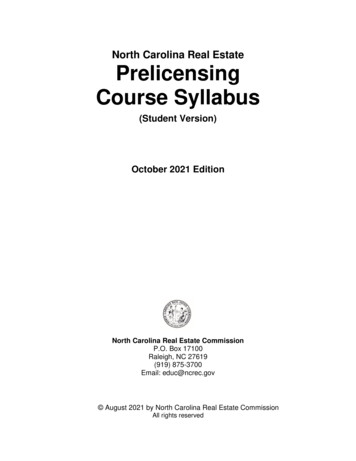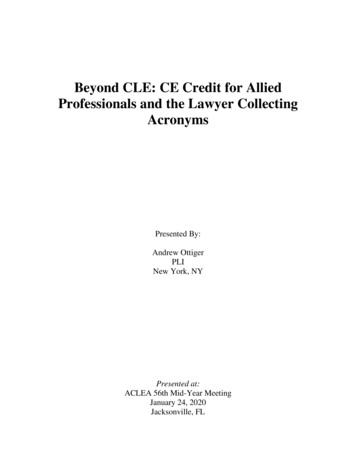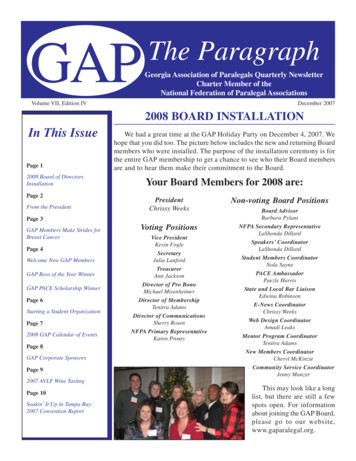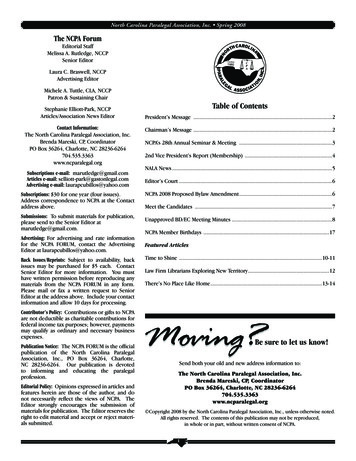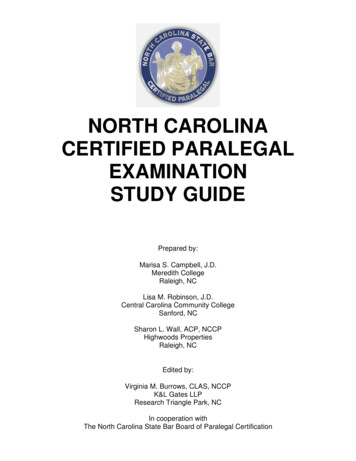
Transcription
NORTH CAROLINACERTIFIED PARALEGALEXAMINATIONSTUDY GUIDEPrepared by:Marisa S. Campbell, J.D.Meredith CollegeRaleigh, NCLisa M. Robinson, J.D.Central Carolina Community CollegeSanford, NCSharon L. Wall, ACP, NCCPHighwoods PropertiesRaleigh, NCEdited by:Virginia M. Burrows, CLAS, NCCPK&L Gates LLPResearch Triangle Park, NCIn cooperation withThe North Carolina State Bar Board of Paralegal Certification
Table of ContentsIntroduction . 1Examination Overview . 3History of Certification in North Carolina. 5North Carolina Certified Paralegal Requirements . 8References . 11Sample Questions . 15DOMAINSCommunication . 20Organization . 29Documentation . 35Analysis . 40Research . 45AREAS OF LAWCivil Litigation . 51Commercial Law . 54Criminal Law . 57Ethics . 60Family Law . 65Grammar . 67Real Estate . 68Wills, Trusts, and Estates . 72Legal Terminology . 74 2013 North Carolina State Bar Board of Paralegal Certification
INTRODUCTIONWelcome to the study guide for the North Carolina State Bar’s Plan for Certification ofParalegals examination! This study guide was designed to provide a roadmap to assistall those studying to take the certification examination. While your coursework in yourparalegal program should have given you the tools to study for the examination, thisstudy guide is much more focused on the examination itself. The examination was notdesigned as a pedagogical tool; it was designed as a way to determine whether anapplicant can demonstrate a basic level of understanding of the law and the legalprocesses in North Carolina.The purpose of the North Carolina State Bar’s Plan for Certification of Paralegals(27 NCAC 1G) is to assist in the delivery of legal services to the public by identifyingindividuals who are qualified by education and training and have demonstratedknowledge, skill, and proficiency to perform substantive legal work under the directionand supervision of a licensed lawyer (including any individual who may be otherwiseauthorized by applicable state or federal law to provide legal services directly to thepublic) and to improve the competency of those individuals by establishing mandatorycontinuing legal education and other requirements of certification. We encourage you toread the Plan for Certification of Paralegals in its entirety, which can be found on the NCState Bar’s website at http://www.ncbar.com/rules.The North Carolina State Bar’s Plan for Certification of Paralegals includes arequirement that North Carolina Certified Paralegals meet minimum educationalstandards, pass a basic competency examination, and maintain the certification throughcontinuing education. This guide was created to assist examination applicants toprepare for the examination. This guide is not meant to be comprehensive. Thepurpose of this guide is to provide applicants with a starting point for studying for theexamination and also a source for basic test-taking strategies.Each of you taking the examination has graduated from a qualified legal studiesprogram. The best resources that you have in studying for this examination are yourprogram materials. You have already learned the elements of a contract, the differencebetween a general warranty deed and a quitclaim deed, the elements of assault andbattery, and rules regarding client confidentiality. We hope that this guide will help youto access the information you have already learned and be successful on theexamination.The examination is all multiple choice questions. Unlike some tests, guessing in itselfwill not harm your score. If you do not know the answer to one of the questions, firstsee if you can eliminate one or two answers. Then, see which answer makes the mostsense. If all else fails, do not leave any of the questions unanswered – there are noDisclaimer - All information on the examination provided above is subject to change without notice at thediscretion of the North Carolina State Bar or the Board of Paralegal Certification.1
penalties for guessing wrong, but your answer will certainly get marked wrong if you failto answer at all.This guide is meant to provide you with a place to learn to organize how you study andto provide all applicants with a basic understanding of how the examination isstructured. We wish you the best of luck as you prepare for and take the examination,and we look forward to having you join the ranks of North Carolina Certified Paralegals.Disclaimer - All information on the examination provided above is subject to change without notice at thediscretion of the North Carolina State Bar or the Board of Paralegal Certification.2
EXAMINATION OVERVIEWApplication processYou may apply to the North Carolina Certified Paralegal program after graduation froma paralegal school with a certificate or diploma, associate’s, bachelor’s, or master’sdegree. The paralegal school must have been approved by the Board of ParalegalCertification as a “qualified paralegal studies program” as defined in the “North CarolinaCertified Paralegal Requirements” section of this study manual.Applications are accepted by the North Carolina State Bar on a continuous basis. Theapplication may be found at the North Carolina Certified Paralegal’s website(www.nccertifiedparalegal.gov). To apply, complete the application, enclose theapplication fee, and mail the application to the following address: Director, NorthCarolina State Bar Board of Paralegal Certification, Post Office Box 25908, Raleigh,NC 27611.The Board of Paralegal Certification of the North Carolina State Bar currently offers therequired examination twice a year, typically in April and October. Please refer to themost recent application form for the amount of the application fee, examination fee, andother examination instructions.Taking the examinationThe examination consists of 150 multiple choice questions. You have three hours tocomplete the examination. Because the questions change each time an examination isgiven, the passing score varies with each testing.The examination is organized into five “performance domains.” Performance domainsidentify the core competencies required for the proficient job performance of a NorthCarolina Certified Paralegal. Experienced paralegals were surveyed and theirresponses determined the performance domains. These domains are tested byquestions on a particular area of law (e.g., civil litigation). Within these performancedomains, there are several tasks that will be tested. Following are the performancedomains or core competencies associated with the tasks:Disclaimer - All information on the examination provided above is subject to change without notice at thediscretion of the North Carolina State Bar or the Board of Paralegal Certification.3
DomainCommunicationTasksDiscuss and comprehend work tasks; gather and reportinvestigative information; relay initial and follow-up information;interact with client and attorney; adhere to ethical standards ofthe legal profession.ResearchDetermine applicable sources; understand primary andsecondary authorities; gather research information.AnalysisDetermine relevant information; assess client situation andsuggest possible courses of action for attorney consideration;analyze proposed courses of action.DocumentationDraft documents and correspondence; coordinate documentexecution, filing, and recording; coordinate service of process;create form documents; review documents to maintain validity.OrganizationCoordinate schedules; maintain tickler system; create, utilize,and maintain proper file management techniques; prioritizeworkload assignments.Within these domains, applicants will find questions in the following substantive areas ofthe law: Civil Litigation, Commercial Law, Criminal Law, Ethics, Family Law, LegalResearch, Real Property, and Wills, Trusts, and Estate Administration. The legalsubjects to be tested are based upon a review of the core curriculum required by thecommunity college system for paralegal studies programs in North Carolina, whichgenerally follows the core curriculum for ABA-approved paralegal studies programs.Please note that exam questions are written to test the domains and the tasksreferenced above. The questions may not be equally distributed among the differentareas of law.The examination is based primarily on North Carolina law; however, some federaland/or common law questions may be asked to the extent they are relevant to the coreknowledge required of a North Carolina paralegal.If you do not pass the examination, you may retake the examination the next time it isoffered. You must retake the entire examination. The examination is not divided intosections for grading purposes.4Disclaimer - All information on the examination provided above is subject to change without notice at thediscretion of the North Carolina State Bar or the Board of Paralegal Certification.
Council Proposes Plan for Certification of ParalegalsBy J. Michael BooeChair, Legislative Study Committee on Paralegal RegulationThis article is reprinted with permission from the North Carolina State Bar.(North Carolina State Bar Journal, Summer 2004, Vol. 9, No. 2.)During the 1990’s, many paralegals in North Carolina became frustrated with theperceived ambiguity between the widespread recognition of the profession in the legalcommunity and by the public, and the fact that anyone could call himself or herself aparalegal without any formal education or training. In addition, paralegals began toconfront the professional development and unauthorized practice of law issues whichhad led some other jurisdictions to undertake to define the role of paralegals and toregulate the services paralegals provide.In February 2001, after some paralegal organizations had spent five yearsresearching paralegal regulation issues, conducting educational meetings on paralegalregulation, and polling paralegals across the state on their opinions involving suchregulation, the Alliance for Paralegal Professional Standards (“APPS”) was formed.See sidebar. An ad hoc organization, APPS’ stated purpose was to identify theparalegal profession, to enhance the status of the profession, and to create a unifiedregulatory voice for North Carolina paralegals. APPS recognized that attorneyparticipation in the process was not only desirable but also necessary, and in June2001, it invited the State Bar to participate in its deliberations. At the time, the State Barwas reluctant to participate because regulatory authority for paralegals was notexpressly delegated to it by the General Assembly and there was no demand fromlawyers to seek such authority. Without the involvement of the State Bar, APPSpressed forward.By the fall of 2002, APPS had revised its goals to be (1) to enhance the quality oflegal services provided to the general public by establishing minimum standards forNorth Carolina paralegals; (2) to facilitate the employment of paralegals by NorthCarolina attorneys by ensuring that prospective paralegal employees meet minimumstandards and (3) to enhance the paralegal profession in North Carolina. As a result ofthe efforts of APPS, Senator Tony Rand, with the co-sponsorship of RepresentativeRick Glazer, introduced in April 2003 the Paralegal Professional Act (the bill). The billresembled an act proposed by APPS, but it contained materials revisions inserted bythe bill drafting staff of the General Assembly. Fundamentally, the bill was a titling act;that is, it prohibited anyone in North Carolina from using the designation “paralegal”unless the person met certain educational or experiential qualifications. The bill alsoestablished an independent, 19-member, North Carolina Paralegal Regulation Board toDisclaimer - All information on the examination provided above is subject to change without notice at thediscretion of the North Carolina State Bar or the Board of Paralegal Certification.5
oversee the program. The bill did not, however, prohibit non-lawyers who were not“paralegals” from performing any task assigned to them by a supervising lawyer.At its April 2003 meeting, the Emerging Issues and Legislative Committees of theState Bar Council voted to oppose the bill, principally because the definition of“paralegal” contained in the bill appeared to embrace virtually all non-lawyers employedin law offices and because there appeared to be little justification for the creation of anew regulatory agency for service providers who are obligated to act under thesupervision of licensed and regulated lawyers. Upon learning that the State Baropposed the bill, APPS asked the sponsors of the bill to suspend activity.Subsequently, APPS made a presentation to a joint meeting of the Emerging Issuesand Legislative Committees in July 2003, at which it urged the State Bar Council tosupport the bill in some revised form. As a result of that meeting, Jim Dorsett, thenPresident of the State Bar, appointed the Legislative Study Committee on ParalegalRegulation as a subcommittee of the Legislative Committee (“subcommittee”). Thesubcommittee’s charge was to work with APPS and its constituent groups with the goalof finding a compromise that could be supported by both the paralegals and the StateBar Council.The subcommittee met with the constituent paralegal groups for the first time onOctober 1, 2003. After considerable discussion, the subcommittee rejected the conceptof regulating the use of the title “paralegal” and also rejected a proposal to license andregulate paralegals. It agreed, instead, to pursue a plan to establish minimumstandards for voluntary designation of qualified individuals as “board certifiedparalegals” while invoking as little legislative change as possible.With those goals in mind, the subcommittee drafted a plan for paralegalcertification modeled loosely on the State Bar’s Plan of Legal Specialization to be addedas a new section of the Rules and Regulations of the State Bar. Like specialization,paralegal certification is wholly voluntary. Unlike specialization, however, initialparalegal certification is intended to be broadly inclusive by establishing a minimumlevel of education and experience in order to be designated a “board certifiedparalegal,” and requiring a minimum level of continuing education to maintaincertification. The subcommittee also proposed amending Chapter 84 to authorize theState Bar to create and enforce such a program.1 At the April meeting of the council,1The proposed amendment of G.S. 84-23 (Powers of Council) will give the council the authority to takeactions to ensure the competency of the nonlawyer assistants of lawyers. The proposed amendment ofG.S. 84-37 (State Bar may investigate and enjoin unauthorized practice) will authorize the State Bar toenjoin the unauthorized use of the “certified paralegal” designation. Legislation to amend these statuteswill be introduced in the General Assembly this summer. The rules for paralegal certification will not befinally adopted by the council and submitted to the Supreme Court for approval until the statutes areamended.Disclaimer - All information on the examination provided above is subject to change without notice at thediscretion of the North Carolina State Bar or the Board of Paralegal Certification.6
the proposed rules for the Plan for Certification of Paralegals were approved forpublication by a unanimous vote.The subcommittee, the Legislative Committee, the State Bar Council and all ofthe constituent paralegal groups believe that the Plan for Certification of Paralegalsstrikes an appropriate balance between the interests of paralegals, the interests of theBar and the interests of the public. First, it’s totally voluntary. Second, it does not seekto differentiate services that can be performed by certified paralegals, non-certifiedparalegals or other non-lawyer employees in a law office. Third, it provides an incentiveto paralegals to meet the educational and experiential qualifications for initialcertification, and to participate in annual continuing education to maintain certification.Fourth, after the initial two-year alternative qualification period, it requires anexamination as a prerequisite to certification to ensure that certified paralegals have afundamental understanding of North Carolina statutes, practices and ethicalconsiderations. Fifth, it will be a self-funding program administered under the auspicesof the North Carolina State Bar by a board appointed and supervised by the State BarCouncil. Finally, it will benefit the general public by enhancing the knowledge and skillsof the paralegals who support lawyers who, in turn, provide legal services to the citizensof this State.Disclaimer - All information on the examination provided above is subject to change without notice at thediscretion of the North Carolina State Bar or the Board of Paralegal Certification.7
NORTH CAROLINA CERTIFIED PARALEGAL REQUIREMENTSQualificationsTo become a North Carolina Certified Paralegal, you must fulfill the educationalrequirements of Rule .0119(a) of the Plan for Paralegal Certification (27 NCAC 1G) andsuccessfully pass an examination.To be eligible to sit for the examination, an applicant must satisfy the following criteria:1. Be a legal resident of the United States.2. Have a degree in paralegal studies from a qualified paralegal studies program. Seethe “Qualified Paralegal Studies Programs” section below for more information.3. Submit a completed application along with the appropriate application fee. Theapplication must be sworn to (or affirmed) and signed in the presence of a NotaryPublic. An official transcript from your paralegal program must also be provided withyour application.Qualified Paralegal Studies ProgramsTo satisfy the educational requirements for certification, a paralegal studies programmust be designated by the Board of Paralegal Certification (“Board”) as “qualified” underRule .0119(a) of The Plan for Paralegal Certification, 27 NCAC 1G, Section .0100. Alist of all North Carolina paralegal studies programs designated as “qualified” by theBoard and the date upon which the designation became effective can be found All programs approved by the American Bar Association (“ABA”) are designated by theBoard as qualified effective two years prior to the ABA approval. A list of ABA-approvedprograms can be found at ectory.Programs provided by institutional members of the American Association for ParalegalEducation (AAfPE) are also designated as qualified effective one year prior to theinstitution’s membership. A list of AAfPE-approved programs can be found athttp://www.aafpe.org/Directory/index.asp.The checklist below sets forth the minimum education criteria for certification ofprograms that are not ABA-approved or not institutional members of AAfPE. The listcontains the ABA requirements that could be reduced to a checklist, but the list does notinclude evaluation of the underlying quality of the program. Please be advised that aDisclaimer - All information on the examination provided above is subject to change without notice at thediscretion of the North Carolina State Bar or the Board of Paralegal Certification.8
program’s ability to meet the requirements on this checklist will not necessarily lead toABA-approval or qualify a program for North Carolina State Bar paralegal certificationpurposes.All programs must answer the following questions in the affirmative:1. Do all of the legal specialty courses developed for paralegals cover substantive lawor legal procedures and process and emphasize practical paralegal skills?2. Does the program offer Legal Research and Writing courses and cover electronicresources?3. Does the program offer a course in ethics and professional responsibility?4. Are students required to take at least 10 semester credits, or the equivalent, oftraditional (not online) classroom instruction?5. If some of the legal specialty courses are taught in a non-traditional format (such asonline), are the instructors available for feedback and can you identify studentssubmitting homework and taking examinations?In addition, depending upon the type of degree offered, a program must meet thefollowing requirements:Associate’s or Bachelor’s Degree: The program must require at least 60 credit hours, orthe equivalent, of general education courses and legal specialty courses. Of the60 credit hours, at least 18 credit hours, or the equivalent, must be legal specialtycourses.Certificate or Diploma Program: Students must already have either an Associate’sDegree or a Bachelor’s Degree which was composed of at least 60 credit hours, or theequivalent, of general education courses, and the Certificate or Diploma Program mustconsist of at least 18 credit hours, or the equivalent, of legal specialty courses.Please be advised that pursuant to the above checklist, paralegal studiesprograms that can be completed entirely online cannot be qualified as a“Qualified Paralegal Studies Program,” and thus do not fulfill the educationrequirements to be able to sit for the examination.Disclaimer - All information on the examination provided above is subject to change without notice at thediscretion of the North Carolina State Bar or the Board of Paralegal Certification.9
FormsApplication forms for certification can be obtained p or by calling the NC State Bar at(919) 828-4620.Cost for CertificationThe initial application must be accompanied by a check for 125.00. When you receivenotification of the approval of your application, you must submit a 50.00 check for theexamination fee prior to taking the examination. Both checks should be made payableto the North Carolina State Bar Board of Paralegal Certification. Certification is grantedfor a period of one year.RenewalsThe annual renewal fee is 50.00. To qualify for continued certification, each year acertified paralegal must participate in not less than six hours of Board-approvedContinuing Paralegal Education (“CPE”) and complete and return the Application forParalegal Recertification. One hour of the six CPE credits must be inethics/professional responsibility. Renewals are due on either January 1 or July 1 ofeach year, depending on the first date of certification. All programs approved forContinuing Legal Education credit for lawyers are automatically approved for CPEcredit.ExaminationThe examination is administered twice a year, usually in April and October, in variouscities around the state. The Board of Paralegal Certification reserves the right to cancelany examination site if there are less than five applicants registered for that location.Examination ResultsThe results of the examination will be sent by mail approximately 60 days after theexamination. An applicant can also see his or her updated status on the “ParalegalSearch” page of our website, www.nccertifiedparalegal.gov. If you do not pass theexamination, you may retake the examination the next time it is offered. You mustretake the entire examination. The examination is not divided into sections for gradingpurposes.Disclaimer - All information on the examination provided above is subject to change without notice at thediscretion of the North Carolina State Bar or the Board of Paralegal Certification.10
REFERENCESListed below are references used in creating the examination. The list is not, and is notintended to be, a complete list of all references which have been used or may be usedin the future. NOTE: This list refers to the current edition of each reference.TEXTBOOKSBevans, Neal R. Business Law, A Hands-On Approach. Clifton Park, NY: West LegalStudies.Bevans, Neal R. Introduction to Law for Paralegals. New York, NY: Aspen Publishers.Bevans, Neal R. Real Estate and Property Law for Paralegals. New York, NY: AspenPublishers.Bevans, Neal R. Tort Law for Paralegals. Austin, TX: Wolters Kluwer.Bouchoux, Deborah E. Legal Research and Writing for Paralegals. New York, NY:Wolters Kluwer Publishers.Bouchoux, Deborah E. The Practical Paralegal. New York, NY: Aspen Publishers.Cannon, Therese A. Concise Guide to Paralegal Ethics. New York, NY: AspenPublishers.Cannon, Therese A. Ethics and Professional Responsibility for Paralegals. Frederick,MD: Wolters Kluwer.Cheeseman, Henry R. Contemporary Business and Online Commerce Law. UpperSaddle River, NJ: Pierson Education Inc.Currier, Katherine A. and Thomas E. Eimermann. The Study of Law: A CriticalThinking Approach. New York: Aspen Publishers.Edwards, Linda L., Jay Stanley Edwards, and Patricia K. Wells. Tort Law. Clifton Park,NY: Delmar Cengage Learning.Everett-Nollkamper, Pamela. Fundamentals of Law Office Management. Clifton Park,NY: Delmar Cengage Learning.Disclaimer - All information on the examination provided above is subject to change without notice at thediscretion of the North Carolina State Bar or the Board of Paralegal Certification.11
Galaty, Fillmore W. Modern Real Estate Law in the North Carolina. La Crosse, WI:Dearborn Real Estate Education.Garner, Bryan A., Editor in Chief. Black’s Law Dictionary. Eagan, MN: ThompsonWest.Gensler, Steven S. Federal Rules of Civil Procedure. Danvers, MA: ThomsonReuters/West.Harvard Law Review (Compiler). The Bluebook – A Uniform System of Citation.Cambridge: Harvard Law Review Association, MA.Helewitz, Jeffrey A. Basic Contract Law for Paralegals. New York: Aspen Publishers,NY.Helewitz, Jeffrey A. Basic Wills, Trusts, and Estates for Paralegals. New York, NY:Aspen College Series of Wolters Kluwer.Hower, Dennis R. Wills, Trusts, and Estate Administration for the Paralegal. Albany,New York: West-Thomson Learning.Kelso, Lloyd T. North Carolina Practice Series, North Carolina Family Law Practice,Volume 1. Eagan, MN: Thomson West.Kerley, Peggy, Joanne Banker Hames, and Paul A. Sukys. Civil Litigation. Clifton Park,NY: Delmar Cengage Learning.Koerselman, Virginia. CLA Review Manual. Albany, NY: West Publishing.Lawyers Mutual Liability Insurance of North Carolina. Ethics for the Legal Support Staff.Cary, NC: Lawyers Mutual.Maerowitz, Marlene A. and Thomas A. Mauet. Fundamentals of Litigation forParalegals. New York, NY: Aspen Publishers.Mauet, Thomas. Fundamentals of Trial Techniques. Little Brown & Co Law &Business.McCord, James W. H. The Litigation Paralegal, A Systems Approach. Clifton Park, NY:Delmar Cengage Learning.Merriam-Webster, Incorporated. Merriam-Webster Online. http://www.merriamwebster.com .Disclaimer - All information on the examination provided above is subject to change without notice at thediscretion of the North Carolina State Bar or the Board of Paralegal Certification.12
Miller, Roger LeRoy, and Gaylord A. Jentz. Business Law Today. Eagan, MN:Thomson Publishing.Miller, Roger LeRoy and Mary Meinzinger Urisko. West’s Paralegal Today: LegalTeam at Work. Clifton Park, NY: Delmar Cengage Learning.National Association of Legal Assistants. NALA Manual for Paralegals and LegalAssistants, A General Skills & Litigation Guide for Today's Professionals. SanFrancisco, CA: West Publishing Company.Orkent, Cathy J. Torts and Personal Injury Law. Clifton Park, NY: Delmar CengageLearning.Random House. Random House Webster’s College Dictionary. New York, NY:Random House Reference.Richardson, J.D., Elizabeth C. and Milton C. Regan, Jr. Civil Litigation for Paralegals.Albany, New York: West Publishing.Rohwer, Claude D. and Anthony M. Skrocki. Contracts in a Nutshell. St. Paul, MN:West Nutshell Series.Sabin, William. The Gregg Reference Manual. Columbus, OH: McGraw-Hill.Schiro, Lilona S. North Carolina Real Estate Title Searches. Suwanee, GA: TheHarrison Company.Statsky, William P. Family Law. Albany, NY: West Legal Studies.Statsky, William P. Introduction to Paralegalism: Perspectives, Problems, and Skills.Clifton Park, NY: Delmar Cengage Learning.Strunk, Jr., William and E.B. White. The
Welcome to the study guide for the North Carolina State Bar's Plan for Certification of Paralegals examination! This study guide was designed to provide a roadmap to assist all those studying to take the certification examination. While your coursework in your paralegal program should have given you the tools to study for the examination, this
